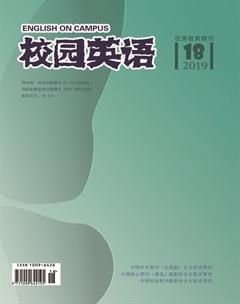Semantic Analysis of the Internet Neologism “Foxi”
【Abstract】Based on the classification of word meaning by linguist Geoffrey Leech, this thesis conducts a semantic study of the Internet neologism “Foxi” based on the collected data. Its found that “Foxi” has all the seven kinds of meaning.
【Key words】neologism; meaning; Leech; Foxi
【作者简介】梁听雪(1997-),女,山东淄博人,中国地质大学(武汉)外国语学院本科在读,研究方向:英语语言文学。
1. Introduction
The neologism “Foxi” , “佛系” in Chinese, which went rival and became a prototype for imitation, is a by-product of the uneasiness bred by the contemporary society in which rapid advancements and high demands are the order of the day. The classification of word meaning is of great significance to the semantic analysis of Internet neologisms, so this thesis aims to deeply explore the conceptual, associative, and thematic meaning of “Foxi” in various contexts in light of Leechs seven types of word meaning. In order to have a close study, 46 pieces of linguistic data are collected from people.cn, xinhuanet, SOHU.com, IFENG.COM, NETEASE, and Baidu search engine. It is hoped that this study can help people better understand the complicated meaning and deep implication of “Foxi” and the social and cultural factors behind its emergence and popularity.
2. Geoffrey Leechs Seven Types of Meaning
In Semantics, Leech (1974) makes a detailed categorization of word meaning. Conceptual meaning is the denotative meaning of a word. Connotative meaning refers to the intentional meaning that a word implies. Social meaning refers to the meaning a word conveys about the social circumstance of its use. Affective meaning conveys the feelings, attitudes and opinions of the speaker in linguistic activities. Reflected meaning stands for the meaning of the same word that can make listeners associate one sense of expression with another. Collocative meaning is a words meaning when its used with another word. Thematic meaning is the meaning expressed by the word order of a sentence or the emphasis attached to a word.
3. Semantic Analysis of “Foxi”
3.1 Conceptual meaning
“Foxi” was first introduced to Chinese readers in 2014 from a Japanese magazine that uses“仏男子” to depict a kind of young men who focus mainly on themselves and dont bother to spend time with female friends. It was after this term is explained in a Wechat post《第一批90后已經出家了》that it truly hit the Internet and began to hold the attention of Chinese netizens. At that time, the term has no direct relation with Buddhist religion, but simply refers to a self-centered and process-oriented life attitude. People in this air do things guided by their own interests at their own pace. They are free from strong emotions and firm obsession of the final results. In fact, the term was already used early in 2009, when it was defined as a Buddhist style:《百变千佛:亚洲三大流派佛教造像艺术》:“其中祖师系、佛系、菩萨系……构成了藏传佛教佛像的重要分类。”The headline “一座佛系建筑,让现代人重新感受宗教的力量” highlights the profound artistic features associated with Buddhism.

